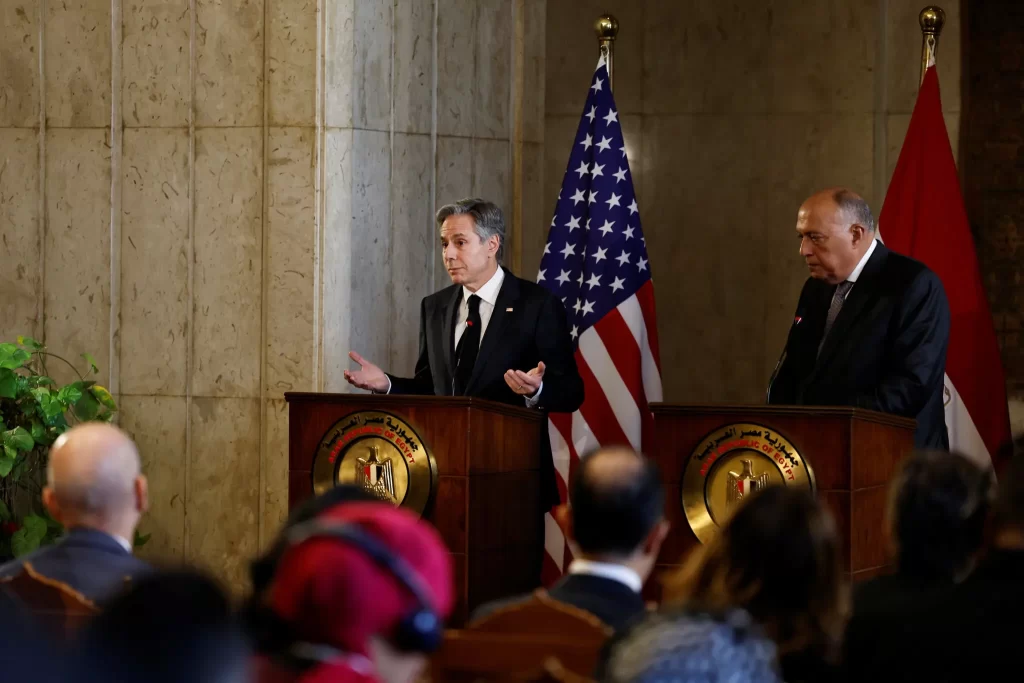
JERUSALEM — Secretary of State Antony J. Blinken arrived in a turbulent Jerusalem on Monday, as the Biden administration tries to contain a new surge of Israeli-Palestinian violence and navigate relations with the country’s new right-wing government.
Mr. Blinken’s visit comes at a potentially explosive moment in the Israeli-Palestinian conflict, after several bloody episodes over the past week that have U.S. officials concerned about a potential major escalation there.
Upon landing in Israel, Mr. Blinken gave a statement saying he had arrived “at a pivotal” moment. He went on to condemn and offer sympathy for the victims of shootings last week in Jerusalem, saying an attack outside a synagogue was “especially shocking” for having occurred by a place of worship.
Mr. Blinken also appealed for calm amid worries about escalatory responses. “Calls for vengeance against more innocent victims are not the answer,” he added. “And acts of retaliatory violence against civilians are never justified.”
At the same time, a plan by Prime Minister Benjamin Netanyahu’s narrowly elected government to assert more control over Israel’s judiciary has prompted huge street protests and raised alarms that his far-right coalition will undermine the country’s democratic norms.
Mr. Blinken, who arrived in Jerusalem after a weekend stop in Cairo, will try to balance America’s close alliance with Israel against the Biden administration’s concerns about Mr. Netanyahu’s government. Many analysts call the new coalition, which formed last month, the most right-wing and the most religious in Israel’s history.
Mr. Blinken scheduled his visit to confer with Mr. Netanyahu about his agenda, and to address differences on several issues, including the judicial overhaul, relations with the Palestinians, Iran’s nuclear program and the war in Ukraine.
His visit also comes as an Iranian military facility was targeted by a drone attack that senior intelligence officials said was the work of the Mossad, Israel’s premier intelligence agency.

Pool photo by Khaled Desouki
Biden administration officials worry that hard-line positions toward the Palestinians espoused by members of Mr. Netanyahu’s cabinet, including support for greater Israeli control over the West Bank, will make resolving the Israeli-Palestinian conflict even more difficult. And they consider deeply unwise the proposed judicial changes, which would give Mr. Netanyahu’s government more control over appointing judges while weakening the power of the country’s Supreme Court.
Many U.S. officials are also personally wary of Mr. Netanyahu, who returned to the prime minister’s office after a brief political exile and while facing criminal charges. The comeback stunned — and in many cases dismayed — American officials who well remember his bitter clashes with President Barack Obama over Iran, the Palestinians and other matters. The Israeli leader worked closely with President Donald J. Trump, and is largely mistrusted by Democrats as a Republican ally.
“This moment is probably the most severe political challenge to the U.S.-Israel relationship since Menachem Begin became prime minister in 1977,” said Jeremy Ben-Ami, the president of the liberal Israel advocacy group J Street.
Mr. Blinken is set to meet on Monday with Mr. Netanyahu and other Israeli officials. He will also sit down with Israel’s foreign minister and other government officials before traveling to Ramallah, the administrative hub of the Palestinian leadership, on Tuesday.
Despite the tensions, American officials continue to emphasize the importance of the U.S.-Israel relationship. Speaking at J Street’s annual conference in December, Mr. Blinken highlighted America’s “ironclad commitment to Israel’s security, a commitment that has never been stronger than it is today.”

A neighborhood in East Jerusalem on Sunday. Biden administration officials worry that hard-line positions toward the Palestinians espoused by members of Mr. Netanyahu’s cabinet will make resolving the Israeli-Palestinian conflict even more difficult. Afif H. Amireh for The New York Times
But he also outlined areas of concern. Affirming U.S. support for “core democratic principles,” Mr. Blinken said the United States would hold Israel “to the mutual standards we have established in our relationship over the past seven decades.”
And while Mr. Blinken acknowledged that hopes for a two-state solution with the Palestinians appear dim, he said the United States would “unequivocally oppose any acts that undermine the prospects” of such an agreement, including West Bank settlement expansion and steps toward a full annexation of the West Bank, an idea that many on the Israeli right favor.
Mr. Blinken arrives in a tense Israel that is still reeling from a series of attacks in the days before his arrival and giant protests over the judicial proposal, including one in Tel Aviv this month that was attended by as many as 100,000 people. Many smaller protests occurred in Jerusalem.
Those attacks may have been reprisals for an Israeli raid on Thursday on a Palestinian refugee camp in the West Bank city of Jenin, which led to the deaths of 10 Palestinians, including a 61-year-old woman. Palestinian officials called the killings a “massacre,” and the Palestinian Authority suspended its security cooperation with Israel’s military. Israeli officials said the raid was ordered to arrest militants from the Islamic Jihad group planning “major attacks” against Israelis.
The next day, a Palestinian gunman killed at least seven Israelis outside a Jerusalem synagogue. A day after that, two Israelis were shot and wounded in the city by what the Israeli police said was a 13-year-old Palestinian boy. The violence continued on Sunday, when a Palestinian man was fatally shot outside an Israeli settlement in the West Bank and Israeli settlers carried out nearly 150 attacks against Palestinians and their properties across the region.

Family and friends of Eli and Natali Mizrahi, who were killed in a shooting attack in a Jewish settlement in East Jerusalem, at their funeral on Saturday. Amir Levy/Getty Images
U.S. officials and analysts worry that Palestinian frustration with a moribund peace process, along with the rise of hard-line Israeli leaders, has created dry tinder that could burst into a major Palestinian uprising.
In his planned meeting on Tuesday with the Palestinian leader, Mahmoud Abbas, Mr. Blinken is likely to appeal to him to help contain the violence. He will also press Mr. Abbas to avoid pursuing cases against Israel in forums like the International Criminal Court, an approach the Biden administration calls counterproductive.
Thus far, administration officials have tempered their public criticism of Israel’s government, preferring to have difficult conversations in private, according to people familiar with the exchanges, particularly on matters of internal Israeli politics.
“They like to be private and behind the scenes,” Mr. Ben-Ami said. “Our line is that the administration has to be tougher, and more public about it.”
But the plan to exert more political control over the judiciary — especially at a moment when Mr. Netanyahu has three criminal cases pending against him, on charges of bribery, fraud and breach of trust — may be too much for the Biden administration, as well as Congress, to overlook.
“It sucks all the oxygen out of the room,” said David Makovsky, a fellow at the Washington Institute for Near East Policy. A sense that Israel’s judiciary is no longer independent, he said, would mean that “you lose a huge chunk of the U.S.-Israel relationship.”
He added that Mr. Blinken was likely to address the subject “gingerly.”
Briefing reporters last week, Barbara Leaf, the assistant secretary of state for Near Eastern affairs, said that Mr. Blinken would speak to Israeli officials about “our unstinting commitment to Israel’s security and democracy.”
In an interview with The Times of Israel published on Jan. 22, Thomas Nides, the American ambassador to Jerusalem, said the United States hopes Mr. Netanyahu can help to avoid actions that will make cooperating with the Biden administration more difficult.

Prime Minister Benjamin Netanyahu, center, at the scene of the attack in East Jerusalem on Friday. Ahmad Gharabli/Agence France-Presse — Getty Images
Saying that “there’s only so much time in the day,” Mr. Nides added that “it would be enormously helpful if we don’t have to be dealing every day with things that we fundamentally oppose, because that just distracts us from the bigger issues that we’re trying to achieve.”
Mr. Nides said that Mr. Netanyahu had “been around the block multiple times and understands this better” than anyone. “We don’t have to teach this guy the things that we care about,” he added.
But it is unclear how much control Mr. Netanyahu has over his coalition, which functions with a razor-margin majority in Parliament, or whether he will have to accommodate its most conservative members to remain in power.
Mr. Blinken’s trip comes just over a week after a visit by the national security adviser, Jake Sullivan. Israeli media outlets also reported that the C.I.A. director, William J. Burns, was in Israel and the West Bank on Thursday.
Mr. Makovsky said he believed Mr. Netanyahu was likely to visit Mr. Biden at the White House in the near future.
Israel has also been a frustrating partner for the Biden administration on its most pressing priority: the war in Ukraine.

Palestinians inspecting damage after an Israeli raid to arrest gunmen in Jenin in the West Bank last week that led to the deaths of 10 Palestinians. Raneen Sawafta/Reuters
Mr. Netanyahu, like his predecessor, Naftali Bennett, is limiting Israel’s support to Ukraine for fear of angering President Vladimir V. Putin of Russia. Israel conducts cross-border strikes on Iranian and other militant targets in Syria, where Russia has a military presence and condones the attacks. Thus far, Israel’s stance has drawn little public complaint from the Biden administration.
Mr. Netanyahu has also been a vociferous critic of the 2015 Iran nuclear deal, which Mr. Trump withdrew from and which the Biden administration has sought to restore. Those talks are stalled at best, however, making the issue less of an irritant between Israel and the United States.
Both countries are in strong agreement on one point: improving Israel’s relations with its Arab neighbors and building on normalization agreements, known as the Abraham Accords, that were struck during the Trump administration.
After meeting with Mr. Sullivan this month, Mr. Netanyahu’s office issued a statement saying the men had “discussed the next steps to deepen the Abraham Accords and expand the circle of peace, with emphasis on a breakthrough regarding Saudi Arabia.”
While normalized relations with the Saudis are a prime goal for Mr. Netanyahu, analysts say that will be difficult if his government is seen as exerting more control over the West Bank and limiting Palestinian rights.

Carrying the body of a Palestinian who officials say was killed in an Israeli raid in the West Bank village of Jaba earlier this month. Majdi Mohammed/Associated Press
FEATURED IMAGE: A person on a stretcher after a shooting attack outside Jerusalem’s Old City on Saturday. Secretary of State Antony J. Blinken arrives in Israel as violence has been increasing. Ammar Awad/Reuters




